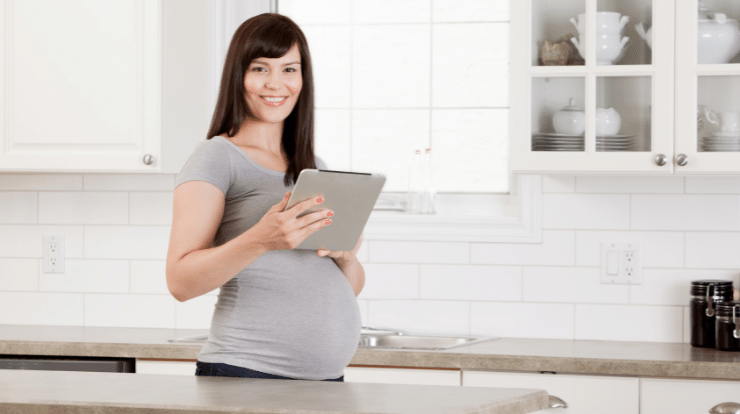
What is nausea in pregnancy?
Nausea is a feeling of sickness or queasiness and is one of the most common symptoms of early pregnancy. It can be accompanied by vomiting, diarrheic and a general feeling of being unwell.
Pregnancy nausea is a common pregnancy symptom that can cause discomfort and stress. It’s caused by the sudden increase of hormones in your body, which causes an upset stomach. You may feel nauseous throughout the day or just before meals. But don’t worry – it doesn’t hurt the baby!
How early is nausea in pregnancy?
Most women will experience some nausea or vomiting during their first trimester of pregnancy. Symptoms can start as early as two weeks after conception and usually peak around eight weeks gestation. However, for some women, nausea and vomiting may not start until later in the first trimester or even into the second trimester.
Is nausea in pregnancy a sign of a girl?
Do you have morning sickness? If so, it might be a sign that you’re having a girl. Studies have found that women with hyperemesis gravidarum are more likely to give birth to girls than boys. This is because the condition has been linked to high levels of estrogen in the body.
What food is good for nausea in pregnancy?
Foods that will help to reduce discomfort and nausea in pregnancy:
- Plain salty crackers with cheese
- Dry Toast + Honey
- noodles or pasta, rice
- fresh vegetables
- Custard and jelly
- dry breakfast cereal or popcorn
- soups
- fresh or dry fruit, canned, stewed
Food to avoid:
- fried foods
- dry chips or nuts
- tea, cold drinks
- spicy foods
- high-fibre bread

What are the symptoms of nausea in pregnancy?
The main symptom of nausea in pregnancy is a feeling of sickness or queasiness in the stomach. This can be accompanied by a loss of appetite, vomiting, and general feelings of unwellness. Some women also experience headaches, dizziness, and mood changes. The symptoms usually start around the sixth week of pregnancy and may last until the end of the pregnancy.
What are the causes of nausea in pregnancy?
There are many different causes of nausea in pregnancy. Some women experience morning sickness, which is a type of nausea that occurs most commonly in the morning, but it can occur at any time of the day. Other causes of nausea during pregnancy can include:
- Hunger or dehydration
- Anxiety or stress
- Motion sickness
- Gastroenteritis
- Food poisoning
- Flu or other illness
- Hormonal changes during pregnancy
Can dehydration cause nausea in pregnancy?
Yes, dehydration can cause nausea during pregnancy. When you are pregnant, your body produces more blood and fluids to support the growing baby. If you don’t drink enough fluids, you may become dehydrated and experience nausea.
What are some signs of dehydration?
Some signs of dehydration include thirst, dry mouth, tiredness, headache, dizziness, and nausea. If you experience any of these symptoms, be sure to drink plenty of fluids.
What are some ways to prevent dehydration?
To prevent dehydration, drink plenty of fluids, especially water. You may also want to consider drinking sports drinks or fruit juices, which can help replace electrolytes that are lost when we sweat. Don’t wait until you feel thirsty to drink fluids, as this means you are already dehydrated.
Can constipation cause nausea in pregnancy?
Yes, constipation can cause nausea in pregnancy. This is because when the bowels are not moving regularly, the stomach has to work harder to digest food. This can lead to feelings of nausea and vomiting.
What are the causes of constipation during pregnancy?
Following are the most common causes of constipation during pregnancy:
- Hormonal changes: Pregnancy hormones can cause the muscles of the digestive system to relax, which can slow down the passage of food through the intestines. This can lead to constipation.
- Dietary changes: Pregnant women often have a decreased appetite and eat less than they normally would. This can lead to constipation because a lack of fibre in the diet can slow down the passage of food through the intestines.
- Physical changes: The increased size of the uterus can put pressure on the colon and intestines, which can slow down the passage of food through the digestive system.
- Lack of exercise: Relaxing too much during pregnancy can cause constipation.
- Medications: Some medications, especially those that relax muscles in the body, can result in constipation.
- Dehydration: Pregnant women should drink eight glasses of water a day, but that’s not always easy to do. Drinking less than eight glasses of water a day can slow down the passage of food through the intestinal tract and cause constipation.
- Sitting or standing too long: Prolonged standing or sitting, especially during the third trimester of pregnancy, can cause you to feel uncomfortable and lead to constipation.

What can you do to relieve constipation during pregnancy?
There are several things that you can do to relieve constipation during pregnancy. These include:
- Drinking plenty of fluids, especially water
- Eating plenty of fiber-rich foods, such as fruits, vegetables, and whole grains
- Exercising regularly
- Chewing gum to stimulate digestive juices
Can sugar cause nausea in pregnancy?
There is no definitive answer to this question as there is limited scientific evidence on the matter. However, some experts believe that consuming too much sugar can lead to nausea and vomiting in pregnancy (NVP). NVP is a common problem during pregnancy, with around 50-80% of women experiencing it at some point. It can range from mild nausea to severe vomiting, and most women will find it unpleasant rather than harmful.
The symptoms of NVP often occur in the first half of pregnancy (the 1st trimester), although many women experience it for the full nine months. NVP can last throughout pregnancy, but if it continues for more than 14 weeks doctors may prescribe medication to help ease the symptoms.
Can milk cause nausea in pregnancy?
There is no clear answer to this question. Some women report that drinking milk makes them feel sick, while others do not have any problems with it. It is possible that some pregnant women are sensitive to the lactose in milk, which can cause nausea and other digestive problems. If you are feeling sick after drinking milk, try avoiding dairy products for a while and see if that helps. There are many other sources of calcium available, so you should be able to find something that works for you. Talk to your doctor if you have any concerns.






